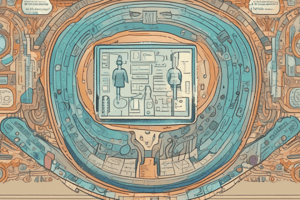Podcast
Questions and Answers
Match the following phases of chronic illness with their descriptions:
Match the following phases of chronic illness with their descriptions:
Pre Trajectory = the onset of symptoms related to chronic conditions Trajectory = the risk for chronic conditions due to genetic factors or lifestyle behaviors Stable Phase = characterized by remission and exacerbation of symptoms Unstable Phase = the control of illness symptoms
Match the following characteristics of chronic conditions with their descriptions:
Match the following characteristics of chronic conditions with their descriptions:
Management is more than treating medical problems = Illness control requires treatment compliance Affects the whole family = Management is the responsibility of people with chronic disorders and their family Management is a collaborative process = Is living with uncertainty May raise difficult ethical issues = Management is expensive
Match the following types of illnesses with their descriptions:
Match the following types of illnesses with their descriptions:
Acute illness = Is a long disease course and may be incurable Chronic Illness = Is curable and has a short disease course Common colds = Examples: Diabetes Cancer Asthma Influenza or “flu” = Examples: Influenza or “flu”
Match the following phases of chronic illness with their descriptions:
Match the following phases of chronic illness with their descriptions:
Match the following characteristics of chronic conditions with their descriptions:
Match the following characteristics of chronic conditions with their descriptions:
Match the following phases of chronic illness with their descriptions:
Match the following phases of chronic illness with their descriptions:
Match the following types of illnesses with their descriptions:
Match the following types of illnesses with their descriptions:
Match the following phases of chronic illness with their descriptions:
Match the following phases of chronic illness with their descriptions:
Match the following characteristics of chronic conditions with their descriptions:
Match the following characteristics of chronic conditions with their descriptions:
Match the following phases of chronic illness with their descriptions:
Match the following phases of chronic illness with their descriptions:
Flashcards are hidden until you start studying




